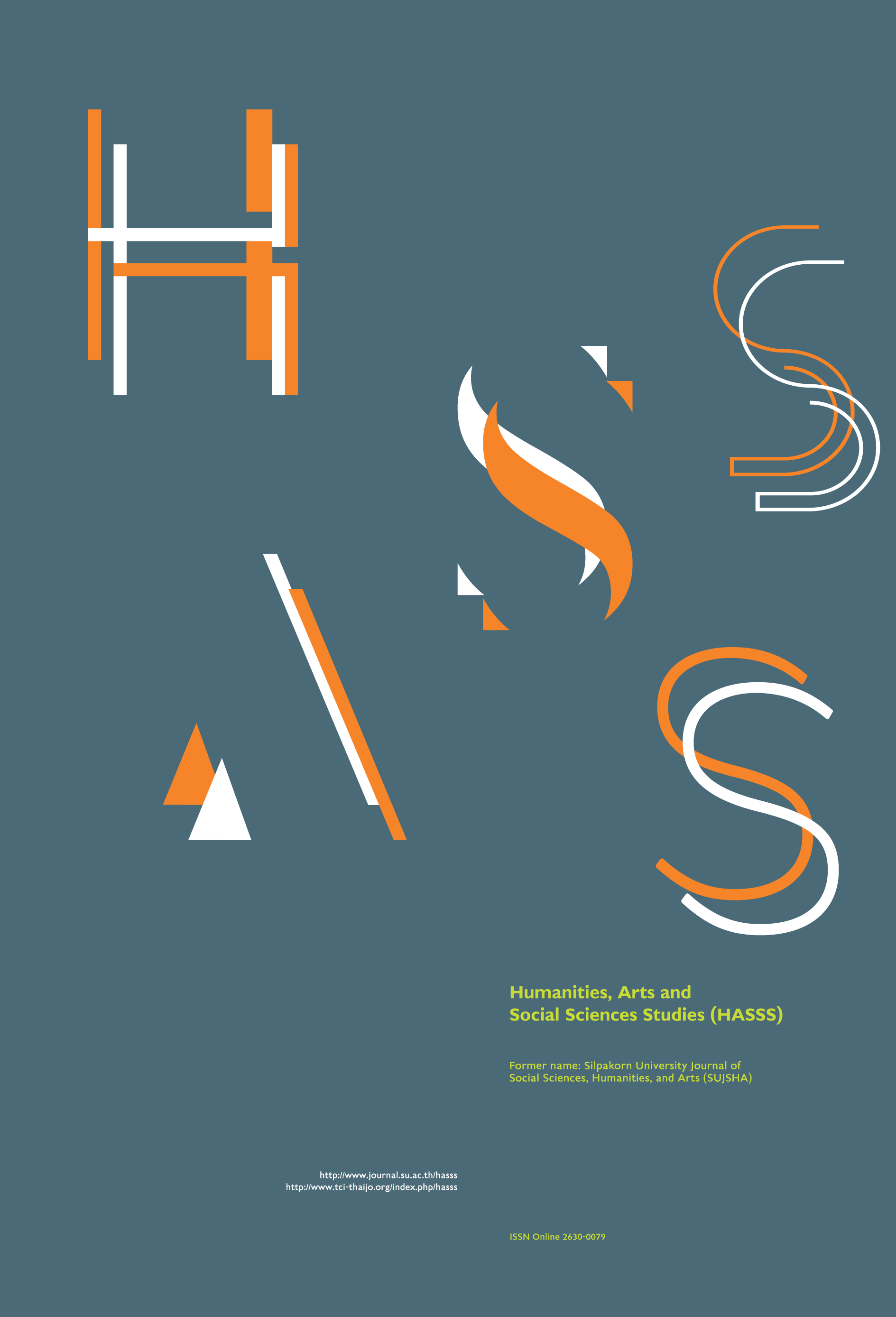The Development of Instructional Using Case-Based Learning Through Collaborative Learning to Promote Pre-Service Teachers’ Ability to Learning Management
Main Article Content
Abstract
The objectives of this study were to 1) develop an instruction using Case-Based Learning (CBL) and Collaborative Learning (CL) to promote the instructional design abilities of Pre-Service Teachers; 2) study the effectiveness of the instructions using conducted model by looking at: 2.1) comparison the learning outcomes of the Pre-Service teachers before and after studying, 2.2) study the learning outcomes of the Pre-Service Teachers’ instruction, 2.3) study the instructional design ability of the Pre-Service teachers and 2.4) feedback of Pre-Service teachers towards the model. The samples were 25 undergraduate Pre-Service teachers at the Faculty of Education, Silpakorn University in Thailand. The samples were purposively selected. The instruments included: 1) instruction using CBL and CL, 2) a comprehensive test; 3) assessment on instructional design abilities; 4) assessment for delivering instructions, and 5) survey on students’ feedback. The study utilized statistics for comparisons including mean, standard deviation, and T-score. The results were as follows: 1) The instruction using CBL and CL for promoting the instructional design abilities of Pre-Service Teachers applies to a 6-step approach called DAISI. The steps are: First: define a situation or event. Second: analyze the problems of the situation. Third: identify alternative solutions. Fourth: search results. Fifth: share knowledge. Sixth: implement the results. 2) The effectiveness of conducted model The Post-Research Stage were: 2.1) The learning outcomes of Pre-Service Teachers after using model were significantly 0.5 higher than before their attendance. 2.2) The overall learning outcomes of Pre-Service Teachers were in a “good” level (x̄ = 23.92, SD = 1.89). The Pre-Service Teachers’ ability to design instructions using model were in a “very good” level (x̄ = 86.66). 2.3) The Pre-Service Teachers’ ability to deliver instructions (field experience) using model was in “good” level (score 76/100). 2.4) Pre-Service Teachers’ satisfaction towards the model was high
(x̄ = 4.28, SD = 0.71).
Downloads
Article Details
All rights reserved. Apart from citations for the purposes of research, private study, or criticism and review,no part of this publication may be reproduced, stored or transmitted in any other form without prior written permission by the publisher.
References
Bergmann, J. and Sams, A. (2012) Flip Your Classroom Reach Every Student in Every Class Every Day. Washington DC: International Society for Technology in Education.
Best, J. W. (1977) Research in Education. 3rd ed. New Jersey: Prentice hall Inc.
Canton, J. (2006) The Extreme Future: The Top Trends that will Reshape the World for the Next 5, 10, and 20 Years. New York: Dutton.
Dechakup, P. (2001) Instruction of Child-Center: Concepts, methods and teaching techniques. Bangkok: The Master Group Management.
Easton, G. (1992) Learning from Case Studies. 2nd ed. Englewood Cliffs, New Jersey: Prentice Hall.
Friedman, G. and Friedman, M. (1998) The Future of War (Power technology and American World Dominance in the 21st Century. Manhattan, NY: St. Martin's Griffin.
Gokhale, A. A. (1995) Collaborative Learning Enhances Critical Thinking. Journal of Technology Education 7(1): 22-30. [Online URL: https://scholar.lib.vt.edu/ejournals/JTE/v7n1/pdf/gokhale.pdf] accessed on January 25, 2001.
Hajkowicz, S., Cook, H. and Lttileboy, A. (2012) Our Future World: Global Megatrends that Will Change the Way We Live. [Online URL: https://publications.csiro.au/rpr/download?pid=csiro:EP126135&dsid=DS2] accessed on April 12, 2018.
Harman, T., Bertrand, B., Greer, A., Pettus, A., Jennings, J., Wall-Bassett, E. and Babatunde, O. T. (2015) Case-Based Learning Facilitates Critical Thinking in Undergraduate Nutrition Education: Students Describe the Big Picture. Journal of the Academy of Nutrition and Dietetics 115(3): 378-388.
Hays, R. (2008) A practical guide to curriculum design: problem-based, case-based or traditional? The Clinical Teacher 5(2): 73-77.
Jaitieng, A. (2007) Teaching Principles. Bangkok: Odeon Store.
Johnson, D. W. and Johnson, R. T. (1994) Leading the Cooperative School. 2nd ed. Edina, MN: Interaction Book Company.
Khemmani, T. (2012) Science of Teaching: Effective Learning Management. Bangkok: Chulalongkorn University Printing House. (in Thai)
Kitroongrueng, P. (2010) Learning Based on Science of Teaching to Enhance Student Teachers’ Critical. Doctoral dissertation. Silpakorn University, Thailand.
Laowreandee, W. (2009) Thinking Skills Instructional Models and Strategies. 4th ed. Nakhon Pathom: Faculty of Education, Silpakorn Universtiy.
Laowreandee, W. (2010) Supervision of Instruction. 7th ed. Nakhonpathom: Silpakorn University Printing House.
Laowreandee, W., Kitroongrueng, P. and Sirisamphan, O. (2017) Active Learning Instructional Strategies for Thinking Development and Educational Improvement of the 21st century. Nakhon Pathom: Petchkasem Printing Group Co.,ltd.
Mellish, J. and Brink, H. (1990) Teaching the Practice of Nursing: A Text in Nursing Didactics. 3rd ed. Durban: Butterworth.
National Institute for Development of Teachers, Faculty Staff and Educational Personnel (NIDTEP), Ministry of Education. (2005) Report on Studies of Trends of Teacher Quality Development for Developing Educational Quality for the 21st Century (Summary). Nakhon Pathom: National Institute for Development of Teachers, Faculty Staff and Educational Personnel (NIDTEP).
Nillapun, M. (2012) Educational research methods. 5th ed. Nakhon Pathom: Silpakorn University.
Panich, V. (2012) Learning Approaches for Students in the 21st Century. Bangkok: Sodsri-Saritwong Foundation.
Slavin, R. E. (1995) Cooperative Learning Theory, Research and Practice. 2nd ed. London: Pearson.
Sinlarat, P. (2014) Thai Education Grow Up Toward the 21st Century. Bangkok: Chulalongkorn University Press.
Sithsungnoen, C. (2015) Documents for teaching courses 111106 Self-Actualization for Teacher in Thai society. Faculty of Education. Phetchaburi Rajabhat University (PBRU).
Sithsungnoen, C. (2018) Implementation of Case-Based Learning for Thinking Skills Development: Essential Skills of the 21st Century of Thai Students. Veridian E-Journal, Silpakorn University 11(4): 19-31.
Williams, B. (2004) The implementation of problem-based learning & case-based learning: shaping the pedagogy in ambulance education - a MUCAPS experience. In Proceedings of the Australian College of Ambulance Professionals, Australia, Alice Springs. September 9-11.


